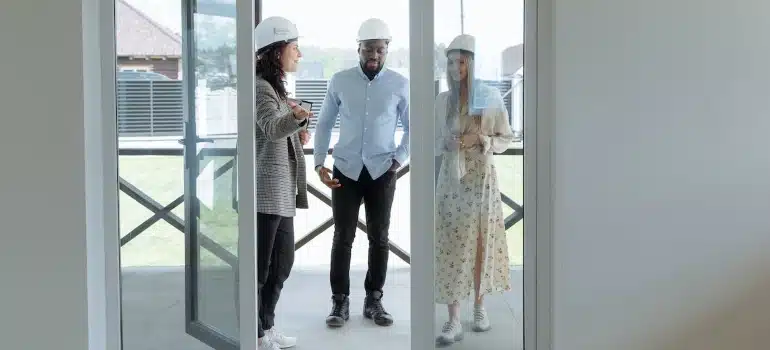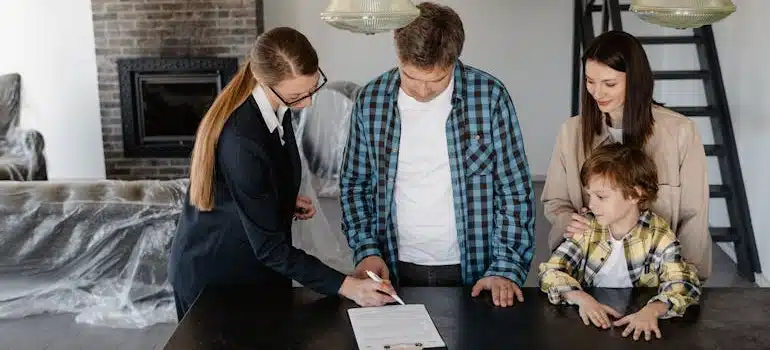How to inspect homes for rent in Florida
Investing in rental properties in Florida requires careful consideration, with property inspections playing a crucial role in the process. These assessments ensure that investors understand the condition of their potential investment, helping to avoid costly surprises down the line. Whether you’re a seasoned investor or new to the rental market, understanding the ins and outs of property inspections can significantly impact your investment’s success. Moreover, considering the logistics of moving and the importance of preparing a property for tenants, partnering with reputable moving companies in Florida can streamline the process. So, let us help you with this guide on how to inspect homes for rent in Florida, from apartments, houses, condos, and duplexes to townhouses, and ensure a smooth transition to your new home.
Inspect location first
Before you even start inspecting homes for rent in Florida, check out the main traits of the chosen location. Start with safety, researching crime rates and the presence of local law enforcement. A safe neighborhood is essential for a comfortable living experience. Next, consider rental costs in the area; compare prices to ensure they align with your budget and the quality of housing. Assess the quality of schools, especially if you have children, as this can impact their education and your long-term satisfaction with the area. Explore job options, focusing on the availability of employment opportunities in your field and the overall job market’s stability.
Lastly, evaluate transport options, including public transportation, major highways, and commute times. Accessibility to these can significantly affect your daily routine and quality of life. After inspecting these factors, you will be able to make an informed decision and hire local movers in Miami or any other city in Florida.

Understanding rental inspections
Before renting a home and hiring local movers in Florida to relocate you, it is important to understand the main traits of home inspection. Namely, rental inspections are key checks done on a property before and after a tenant moves in or out. They help landlords and tenants keep track of the property’s condition. When we talk about move-in inspections, we mean a detailed check before a tenant moves in. This ensures everything is in good shape and in working order. On the flip side, move-out inspections happen when a tenant leaves. They help determine if there are any damages beyond normal wear and tear.
Then, indoor inspections focus on things inside, like appliances and plumbing. Outdoor inspections, however, look at the property’s exterior, including the yard and roof. Each type of inspection serves its unique purpose. It ensures both landlords and tenants have a clear understanding of the property’s condition at different times. This process protects everyone involved and keeps the property in top shape.
Different types of homes require different inspection steps
Inspecting rental properties before hiring long distance movers in Florida for relocation is essential, whether it’s an apartment, house, duplex, or townhouse. Each type has unique aspects to check.
- Apartment inspection focuses on the unit’s interior and shared spaces. Look for water damage, appliance conditions, and overall cleanliness. It’s also important to check for proper fire safety features and noise insulation between units.
- House inspection goes deeper into both indoor and outdoor areas. You need to assess the roof, foundation, and exterior walls for any damage. Inside, check the HVAC system, plumbing, and electrical wiring to ensure everything is up to code.
- Duplex inspection combines elements of apartment and house inspections. Since duplexes share a wall, pay extra attention to the soundproofing and the condition of shared structures. Inspecting the exterior is key for identifying common issues that could affect both units.
- Townhouse inspection requires a look at shared facilities, if any, and the specific unit. Inspect the structural integrity of shared walls and review the homeowner association rules for maintenance responsibilities.
Apartment inspection checklist
When you inspect homes for rent in Florida, start with the basics: test all lights and electrical outlets to make sure they work. Look for signs of water damage on walls and ceilings, as this can indicate hidden issues. Don’t overlook the plumbing; flush toilets and run all faucets to check for leaks or weak water pressure. Inspect appliances and heating/cooling systems to ensure they’re functioning correctly. Lastly, check windows and doors for proper sealing and security. This step-by-step approach helps you identify any potential problems that could turn into costly repairs later, ensuring you make a sound investment. After checking these and making the necessary repairs, you are ready to move in. And for a safe moving experience, check out the best moving services Miami has, and move like a pro.

House inspection checklist
A house inspection checklist covers both indoor and outdoor elements to ensure a comprehensive review of the property. Indoors, examine the condition of floors, walls, and ceilings for signs of damage or mold. Test all electrical outlets, light fixtures, and switches. Inspect the heating, ventilation, and air conditioning systems for proper operation. In the kitchen and bathrooms, check appliances and fixtures for functionality and signs of leaks.
When it comes to the outdoor inspection of homes for rent in Florida, assess the roof for missing shingles or potential leaks. Examine the exterior walls for cracks or damage. Check the foundation for signs of settling or water intrusion. Inspect the gutters and downspouts for blockages or damage. Evaluate the condition of the driveway and walkways for safety. Lastly, assess the landscaping for potential issues with drainage or encroaching roots.
Inspect duplex homes for rent in Florida
assess each unit’s condition separately. Look for consistent quality in terms of flooring, wall integrity, and window seals. Test all appliances, heating, and cooling systems to ensure they are functioning well in both units. Additionally, evaluate the sound insulation between units, as comfort and privacy are crucial for tenants. Inspecting a duplex requires a balance between assessing shared elements and the unique aspects of each unit, ensuring both sides are in good condition for potential renters.

Townhouse inspection checklist
When you want to inspect townhouse homes in Florida, it is crucial to consider these factors. Check the structural integrity, including the roof, foundation, and exterior walls, given Florida’s climate. Next, evaluate the HVAC system, which is vital for dealing with the state’s heat and humidity. Inspect for water damage or mold, common in humid environments. Examine shared walls for soundproofing quality, ensuring privacy. Assess outdoor spaces like patios or balconies for maintenance needs. Lastly, consider the homeowners’ association (HOA) rules and fees, as they can affect maintenance responsibilities and add to the cost. For those who want to clear out the townhome for inspection, it is a wise decision to use storage units Miami moving companies offer in order to have a safe space for furniture and other belongings.
How to inspect farmhouses for rent in Florida
Inspecting farmhouses for rent in Florida requires a more detailed approach in comparison to other house types in order to ensure the property meets your needs. Begin by assessing the exterior, including the roof, walls, and foundation, for any visible damage or signs of neglect. Check for proper drainage to avoid flooding issues during Florida’s rainy season. Inspect the land for usability, ensuring it aligns with your intended purpose, whether farming, gardening, or livestock.
Inside the farmhouse, examine the plumbing, electrical systems, and HVAC for functionality. Look for signs of pests, water damage, or mold, which are common in humid climates. Confirm that windows and doors are secure and functioning well. Additionally, verify the lease terms, zoning regulations, and property boundaries. Ask the landlord about the history of the property and any included maintenance responsibilities. If you decide to move to a farmhouse, our recommendation is Kendall. And our Kendall movers are here to tackle the moving tasks.

How to inspect container houses for rent
Container houses are becoming more and more popular. So, if you are ready for this endeavor of living in a container house, here’s what to pay attention to before renting one:
- Structural integrity: Check for dents, rust, and corrosion on the exterior and interior walls. Look for any damage that may compromise the container’s strength.
- Foundation and stability: Ensure the house is securely placed on a stable and level foundation. Look for signs of shifting or uneven placement.
- Roof condition: Examine the roof for leaks, rust, or damage. Check the seals and welds to ensure they are intact.
- Insulation: Confirm that the container has proper insulation to regulate temperature, especially in extreme climates. Inspect for gaps or wear in insulation materials.
- Ventilation: Check that there is adequate ventilation to prevent condensation and maintain air quality. Look for vents or windows that open easily.
- Plumbing: Inspect plumbing systems, including water lines and drainage. Look for leaks, rust, or signs of blockages.
- Electrical systems: Verify that the electrical wiring is properly installed and safe. Test outlets, switches, and lighting to ensure they function correctly.
- Pest protection: Check for signs of pests such as insects or rodents. Inspect seals and entry points for potential vulnerabilities.
- Finishes and fixtures: Assess the quality and condition of interior finishes, doors, windows, and flooring. Ensure they are secure and functional.
- Zoning and permits: Confirm that the container house complies with local building codes and zoning regulations. Verify permits with the landlord or seller.
And if you decide to rent a container house, hire white glove movers Coconut Grove offers and move like a pro.

How to inspect home outdoor before investing in rental property
When inspecting the outdoor area of a rental property, focus on key aspects that could affect the property’s value and appeal. Start with the exterior walls and foundation, looking for cracks, signs of water damage, or structural issues. Check the roof for missing or damaged shingles and ensure the gutters are in good condition. Examine the landscaping, paying attention to the condition of trees, shrubs, and lawns. Poorly maintained landscaping can indicate neglect.
Look at the driveway, walkways, and outdoor lighting for any signs of wear or safety hazards. Assess the fencing, gates, and outdoor structures like sheds or patios. Finally, check for proper drainage systems to prevent water damage. Only after you check these traits are in good condition can you proceed to invest in a rental property. And for moving outdoor furniture, hire white glove movers Miami Beach to handle everything.
Tenant rights
Before you move in, you should explore tenant rights. Tenants in Florida have the right to a habitable living environment, which means the property must be safe and in good repair. This includes access to running water, functioning heating and cooling systems, and secure and intact structures. Landlords must ensure that any issues affecting habitability are addressed promptly to maintain the property’s livability.

Landlord rules and obligations
Tenants have privacy rights during inspections. Thus, landlords must provide reasonable notice, typically at least 24 hours, before entering the property for inspections, repairs, or maintenance. This notice respects the tenant’s privacy and allows them to prepare for the landlord’s visit. Emergency situations might allow for immediate access without notice, but these are exceptions. Understanding and respecting these rights is crucial for maintaining a positive landlord-tenant relationship and ensuring that inspections are conducted fairly and without infringing on the tenant’s comfort and privacy.
Also, the frequency of inspections should be reasonable. Overdoing visits can disturb tenants and erode trust. Therefore, landlords often conduct inspections at the start and end of a lease or for maintenance issues. Moreover, handling security deposits correctly is crucial. Landlords must store these funds in a Florida bank and inform tenants in writing about where the deposit is held. After a tenant moves out, the landlord has 15 to 60 days to return the deposit or provide a detailed list of deductions for repairs not related to normal wear and tear. These steps ensure transparency and fairness, laying the groundwork for a respectful and legally compliant landlord-tenant relationship.

Should you hire a real estate agent to inspect homes for rent in Florida
Hiring real estate agencies in Florida offers significant benefits, especially when you’re looking for professional property management. These agencies bring expertise to the table, ensuring every inch of the house is thoroughly understood and evaluated. Real estate agents in Florida are well-versed in the local market trends, regulations, and the unique aspects of Florida’s diverse properties, including the environmental factors that affect real estate in the state.
When choosing the right agency, it’s crucial to consider their track record, expertise in the specific type of property you’re interested in, and their understanding of local market dynamics. Agencies like Clever Real Estate, featured on ListWithClever, provide a platform where you can compare top local agents and negotiate better rates, tailoring services to your specific needs. Top Agent Magazine and HomeLight also offer insights into the top real estate professionals across Florida, ensuring you have access to agents who are highly regarded in their field and have a proven track record of success.
A quick relocation guide after inspecting homes for rent in Florida
After inspecting homes for rent in Florida and selecting the perfect property, a well-planned relocation is crucial. First, finalize your rental agreement, ensuring you understand all terms and conditions. Next, schedule utilities and services like water, electricity, internet, and trash collection to be active by your move-in date.
Creating a moving checklist can streamline the process. Start by decluttering your current home to reduce what you need to pack and move. Then, secure a reliable moving company in Fort Lauderdale, for example. Packing efficiently is also key. Label boxes by room and contents for easier unpacking. If moving from a colder climate, consider the Florida weather when deciding what to bring or leave behind. Finally, update your address with the post office, banks, and other important institutions. Exploring your new neighborhood online can help you find local amenities like grocery stores, pharmacies, and parks. If possible, visit the area before moving to familiarize yourself with the community.

A final home inspection before moving in
Inspecting a home for rent In Florida, before movers bring in your belongings, it is crucial to ensure the property is ready for tenancy. The final walkthrough is your last chance to check everything against your initial inspection report. This step is vital to ensure that any agreed-upon repairs have been completed and that the property’s condition hasn’t changed since your last visit. Your checklist for this final inspection should include testing all electrical outlets and fixtures for functionality, running water in all faucets and checking for leaks under sinks, ensuring that all appliances are working correctly, inspecting windows and doors for security and proper sealing, and verifying the operation of the HVAC system for both heating and cooling.
Renovation home inspection: Key steps
When you inspect homes for rent in Florida, do the following:
- Inspect Electrical System: Examine the electrical panel for capacity and safety. Check for outdated or faulty wiring.
- Plumbing: Inspect pipes for leaks, corrosion, or damage. Test the water pressure and check for the water heater’s condition.
- HVAC Systems: Assess the age and condition of heating and cooling systems. Check for proper ventilation and insulation.
- Pest Inspection: Look for signs of termite damage or other pests. Check the attic, basement, and crawl spaces.
Moving out? Conduct a move-out home inspection
Conducting a move-out home inspection is essential for ensuring that the property is left in good condition, potentially impacting the return of your security deposit. This process involves a thorough walkthrough of the home, comparing its current state to the condition documented during the move-in inspection. Key areas to focus on include ensuring all appliances are in working order, checking for damages beyond normal wear and tear, and confirming that all personal belongings are removed.
It’s also important to repair any damage caused during the tenancy, such as holes from hanging pictures or stains on the carpet. Cleaning the property thoroughly, including the kitchen, bathrooms, and living areas, can also make a significant difference. Documenting the property’s condition with photos and a detailed checklist can provide evidence of the property’s condition at move-out. This proactive approach can help avoid disputes with landlords over the security deposit and ensure a smooth transition from the property. Besides, hire white glove moving services to have a safe relocation without any clutter behind.

Bonus information: Rental costs in Floria
Before inspecting rental properties in Florida, it’s helpful to know the typical rental costs in various cities:
- Miami: Average rent is around $2,076 per month; upscale areas can reach $3,087.
- Fort Lauderdale: Average rent is $2,141 per month.
- Hollywood, FL: Average rent is approximately $1,616; affordable neighborhoods start at $1,500.
- Coral Gables: Average rent is about $2,954, with high-end areas like Riviera reaching $3,533.
- Coral Springs: The average rent is around $1,325 per month, which is lower than the national average. So, consider renting a home here and the movers Coral Gables offers.
- National Average: Approximately $1,535 per month
For any relocation, count on Pro Movers Miami
After you inspect homes for rent in Florida and choose the one that suits you, Pro Movers Miami and our high end movers are at your disposal. Relocate whenever you want, choose the moving services that suit you best, and relocate swiftly yet efficiently. Contact us, get your moving quote, and move like a pro.
